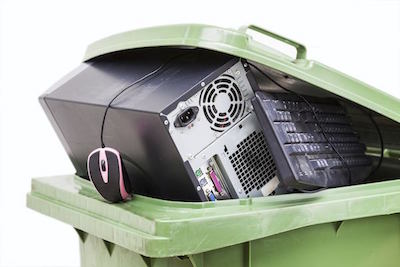8/11/2021

It’s a special day when you get a new desktop or get the opportunity to switch to a lighter and more capable laptop. While transferring files and switching passwords can be a bit challenging, the payoff of a faster and possibly less cumbersome device is typically well worth the extra effort. The resulting improvement in both worker satisfaction and productivity often provides a quick return on investment for businesses, and the increased capabilities of the latest IT devices can be a major boost to the bottom line.
While “new” devices may be well received and readily implemented, one consideration that has to be well thought out these days is what to do with the equipment they’re replacing. In some cases, those devices may go in reserve and be used (at least temporarily) by new hires or when other units are being repaired. While there is no hard and fast “rule” for the number of PCs to maintain for backup to primary systems, industry experts suggest businesses maintain a 5-10% supply. For example, if the company employs 100 people, 5-10 older units would be kept in reserve and regularly serviced to ensure they’re ready for immediate use whenever needed. If the organization is rapidly expanding, those numbers may need to be significantly higher unless an adequate supply of new devices is purchased (and delivered) before the on-boarding process begins.
Even when the company no longer has a use for some of these electronics, others may find a suitable way to extend their lives. PCs and laptops often lose their luster long before their capabilities wane, but a school or other non-profit might be able to refurbish or redeploy them for other uses within their communities. Just because a computer can’t process as fast or run the latest operating system doesn’t mean others won’t find it useful, and the donation to a worthy cause may even be tax deductible!
Of course, after these systems become obsolete, with no viable use to the company or to others, they must be disposed of in a carefully prescribed manner. E-cycling is not just the latest “Green” trend, but a well-defined process required by the federal government, as well as some state and local entities. Some electronics (including computer monitors, tablets, cell phones and other mobile devices) are considered “hazardous” under U.S. law, so each must be properly disposed of and documented to avoid violations and fines. Companies that simply throw old PCs, tablets or other computer systems in their standard waste dumpster face significant fines, as well as negative press and the resulting damage to their reputation if discovered.
State and local regulations are often more stringent. California labels CRT materials (screens and monitors) as hazardous waste and bans them from entering state landfills. Several other localities have developed exemptions for these components to streamline the recycling process, with others looking to implement similar procedures. This assortment of rules creates a challenge for small businesses that infrequently replace their computer systems. Those organizations not already working with experienced solution providers with a comprehensive understanding of these regulations should seriously consider doing so. In addition to sharing their recommendations for disposal and recycling, these service companies will often handle the process themselves and ensure all regulations and other environmental commitments have been fulfilled.
Of course, any business can manage the disposal of electronics on its own, but understanding the various regulations covering electronic waste and e-cycling for every state, county and local municipality isn’t easy—and mistakes can be costly. That’s why computer removal and recycling is typically left to the professionals.

TeamLogic IT Plano, a Team of IT Support consultants, offers premium IT services in the Dallas-Fort worth Metropolitan Area. Our IT services range from basic IT support to advanced security support for small- and medium-sized businesses. Contact TeamLogic IT Plano, one of the best IT Consulting Company in the Dallas-Fort worth Metropolitan Area.





RECENT COMMENTS